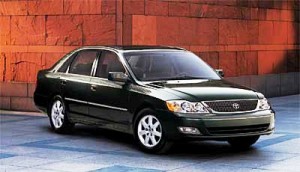For the second time in less than a week, a Japanese automaker is recalling vehicles due to an airbag issue; Toyota is recalling 119,000 2003-2004 Avalons.
The maker said the car’s airbags could inflate without warning or cause, frightening the driver and causing a loss of vehicle control resulting in a collision. Toyota said it is unaware of any accidents or injuries related to the problem.
Toyota reports that certain circuits within the airbag control module may be susceptible to damage if they are exposed to other types electrical components. It’s that contact that could cause the front airbags and/or seat belt pre-tensioners could inadvertently deploy.
The pre-tensioners, which work in concert with airbags, initially tighten belts when a crash is imminent, holding the car’s occupants away from the explosive force of the airbags deploying. Then the tensioners loosen in controlled fashion to let the occupants “ride down” the deflating bags, diffusing the crash energy.
Toyota says dealers will fix the problem by adding what are called “electrical noise filters” to the airbag control modules.
Owners of the recalled cars will receive notice in the mail.
Nissan is recalling 1 million cars, vans and SUVs for the second time to resolve an airbag problem.
(Ford investing $500 million in Lima Engine Plant. For more, Click Here.)
Due to a faulty sensor, passenger-side airbags on the vehicles may not inflate. The sensor does not detect an adult sitting in the passenger seat, according to documents filed with the National Highway Traffic Safety Administration (NHTSA).
(Click Here for details on how much gasoline was saved by EVs in 2013.)
The recall affects the Altima, Leaf, Sentra, Pathfinder models from the 2013 and 2014 model years. Also impacted are the NV200 Taxi van and Infiniti JX35 SUV from 2013 as well as the Infiniti QX60 and Q50 SUVs from 2014.
(To see Nissan’s recall of 1 million vehicles for an airbag issue, Click Here.)
The vehicles were already subject to an earlier recall in February 2013 for a similar problem. At that time, dealers replaced seat sensors, but complaints continued, the company said. The current recall consists of a software update and will begin in the middle of next month.

